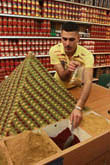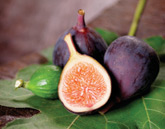×


We have detected your country as:
Please click here to go to the USA website or select another country from the dropdown list.

By Charleeda Sprinkle, Assistant Editor
{image_1}“In Israel, in order to be a realist, you must believe in miracles.” David Ben Gurion
Continue Reading »
{image_1}Although Israel is a very modern country, one of the things that reminds me I’m living in the land of the Bible is the shepherd and his sheep. Since shepherds here are usually Arab, and Arabs often dress in a long, flowing robe and a kaffiyeh on their head, they easily resemble the pictures in Bibles of shepherds of long ago.
Continue Reading »
{image_1} Because of Israel’s year-long celebration of their 60th and this month’s Jerusalem Day (June 2), I wanted to pick a recipe that was particularly descriptive of Israeli cuisine. But, is there really an Israeli cuisine? Because Jewish people have been making aliyah (immigrating to Israel) since the state was born, it’s hard to say what is Israeli. Immigrants have come from more than 50 nations, which makes for a very unique Israeli “soup.” Others say that there is no original Israeli cuisine because everything Israelis eat can be found in other Middle Eastern countries. So, za’atar (or zatar or zahatar) may not be a distinctive Israeli spice, but you can’t be in Israel for long without bumping into it. And once you do, you don’t want to go home without it.
Continue Reading »
By Charleeda Sprinkle, Assistant Editor
{image_1}Jewish people around the world celebrate Hanukkah (Feast of Dedication) by eating oil-soaked foods. Why? The holiday is best known for the miracle of oil that took place after the Temple, polluted by the Greeks in 165 BC, was cleansed. A single day’s oil for the golden menorah (seven-branched candelabra) lasted eight days! The oil, some rabbis say, is like studying Torah (Gen.–Deut.). Just as oil enhances our food, so the Torah enhances our lives. Also, oil illuminates, as does the Torah. And when oil and sugar are combined (as in our recipe), they make the comparison all the more significant. “How sweet are Your words to my taste, sweeter than honey to my mouth!” (Ps. 119:103).
Continue Reading »
{image_1}It is believed by some that the “honey from the rock” was from the fig because the fig tree can grow in rocky places. The natural sweetness of the fruit is attested to in the “parable of the trees,” where the fig tree is asked to be king over all the trees (Judges 9:7–15). The fig’s answer is, “Should I cease my sweetness and my good fruit, and go to sway over trees?” Even the fig is seemingly jealous of its own sweetness.
Continue Reading »Passover and Holocaust Memorial Day usually fall close to each other on the calendar. Is there any connection? I think so, though I’m sure it wasn’t purposely planned.
Continue Reading »By Charleeda Sprinkle
Jewish people have been living in Morocco, on the northwestern corner of Africa, since before the Roman Empire. Before 1948, there were over 265,000 Jews in Morocco; now there are only 5,000 to 7,000. However, approximately 600,000 Moroccan Jews live in Israel today!
Continue Reading »A simple but delicious Middle Eastern soup for a cold winter night’s meal by Hanukkah candlelight!
Continue Reading »The Jewish New Year is celebrated on Rosh Hashanah, Hebrew for “head of the year.” However, you will not find that name in the Bible, even though it is one of the seven biblical feasts. Its biblical name is Yom Teruah, the day of the sounding of trumpets (Lev. 23:23–25). The Jewish New Year is quite solemn compared to rowdy, Western New Year’s Eve parties, as it is understood to be the day God judges His people.
Continue Reading »Often, when my roommates and I have had guests from the nations at our Shabbat (Sabbath) table on Friday night, we have enjoyed serving them a Middle Eastern meal for a special cultural experience. My favorite choice is makluba, an upside-down chicken and rice dish. It has a delicious Middle Eastern flavor and lends to a very dramatic presentation––turning the hot pot upside-down into a perfectly molded creation.
Continue Reading »All logos and trademarks in this site are property of their respective owner. All other materials are property of Bridges for Peace. Copyright © 2025.
Website Site Design by J-Town Internet Services Ltd. - Based in Jerusalem and Serving the World.